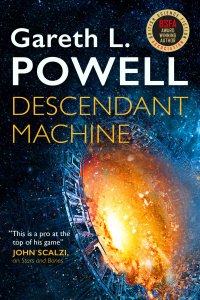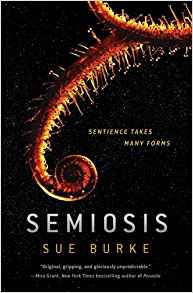Paul Di Filippo Reviews Descendant Machine by Gareth L. Powell
 Descendant Machine, Gareth L. Powell (Titan 978-1789094312, trade paperback, 336pp, $16.95) April 2023
Descendant Machine, Gareth L. Powell (Titan 978-1789094312, trade paperback, 336pp, $16.95) April 2023
Fresh off his Embers of War trilogy, Gareth Powell leaped immediately into a new space opera series, the Continuance, with Stars and Bones (2022). It’s a clever, fresh, and open-ended scenario which, despite an absolute au courant, 21st-century-genre vibe, recalls to my mind several classics of the field. All to the good, say I, for that’s my favorite kind of lineage-honoring fusion. I’ll intersperse my allusions below. Please just regard them as traces of the mental sparks which Powell’s fine book set off in my overstuffed SF brain.
While the newest Continuance book is pretty much enjoyably independent of the first, and features a tidy recap of backstory for newbies, readers would be well served to start with Stars and Bones, which dramatizes everything in much more detail and immediacy.
In Earth’s near-future, nuclear Armageddon is unleashed. The Earth is about to be incinerated by mankind’s folly. But within minutes of the missile impacts, all the weapons are magically disappeared. It eventuates that an Angel of the Benevolence—a superior alien species—who has been watching the Solar System for millennia has intervened. (Childhood’s End, I immediately think.) And the angel’s intervention is all due to the actions of one man, physicist Frank Tucker, who has stumbled on the substrate, that quantum realm that allows for teleportative “flicking.” That discovery immediately raised disposable humanity to sovereign galactic status. But not without a price. All humans are now exiled to the Thousand Arks of the Continuance, spaceships “big as nations” set to roam the stars forever, no permanent destination in mind. (Cities in Flight.)
Seventy-five years pass, and humanity has grown used to its new lifestyle. The Arks are shepherded by small Vanguard ships—human navigator linked to sentient ship brain—that roam ahead, looking for dangers, other civilizations, and resources. (The Voyage of the Space Beagle.) One such scout ship—human Eryn, piloting the Furious Ocelot—encounters a blob-like intelligent plague that threatens to assimilate all the Arks. (Blood Music.) Its defeat comes only after many invigorating heroics and setbacks.
Our second tale opens some fifty years afterwards, and makes very little reference to the past adventure. But Powell boldly ups the ante on this one, ringing in grand super-science constructions and even the heat-death of the universe. He explores Ark life a bit more (flicking from Ark to Ark—what a great notion!), but essentially we are again among the Vanguard loners and misfit adventurers.
Our protagonist this time is the ship Frontier Chic (I should mention that the ship minds can embody themselves in blue-skinned androids, thus offering neat face-to-face human-level interactions; a trope simultaneously developed by Annalee Newitz in her The Terraformers) and Chic’s navigator partner, Nicola Mafalda. Initially, the team is sent to escort a nerdy human genius, Orlando Walden, to the planet Jzat. Although the Jzat have no substrate-flick technology and seem of negligible importance, they do “possess” an ancient anomaly in their solar system: the Grand Mechanism, which might contain “the terminus of a wormhole capable of bridging entire galaxies, [drawing] its power directly from the substrate.”
As the outer door swung open, I saw we had berthed inside a cavernous space within the hoop part of the Mechanism.
Even though I already knew, my guide explained we had no need of pressure suits, as the internal chambers of the hoop contained a breathable atmosphere like that of both Jzat and Earth. The hoop’s spin also produced an apparent gravity comparable to that of either planet, which meant we would be able to move and work in comfort….
[The] interior of the hoop was hardly the most welcoming of environments. The builders had given no thought to aesthetics. Living on an ark, you could sometimes almost forget you were living inside a huge contraption; here, you couldn’t forget it for an instant. The rooms and access ways were simply gaps between stacks of components that ranged from arrays of microscopic circuitry to enigmatic, house-sized structures of semi-exotic metals. The designers had only placed deck plates along the most efficient routes; the rest remained open, exposing the machinery—and the lethal gaps between components—that lay beneath. Moving carefully, we walked through it all like ants exploring a submarine.
But naturally, by way of narrative escalation, the path of both Nicola’s continued involvement in the quest to unriddle the Mechanism and prevent its misuse and Orlando’s scientific investigations does not run smoothly. Soon, Nicola and her Jzat lover Kona are facing perils from alien “megaships” and human competitors like sleazy fellow Vanguard navigator Ewing and his ship Slippery Gecko. A bravura, slambang finish pulls out all the stops.
Powell’s prose is neither poetic nor merely utilitarian, but rather approaches Heinlein’s famous transparency. His dialogue is always believable, always precisely useful, and often quite funny. The relations among all the personages—alien, artificial, or human—feels utterly authentic. Having chapters narrated by different characters—the ship Frontier Chic is the ostensible author of the whole document—gives nice variety. The chapters from the POV of Orlando Walden are a hoot, as he addresses them to his distant inamorata, Ramona. He’s like Stephen Hawking crossed with John Barth’s naïve poet, Ebenezer Cooke.
Full of great stefnal novums and roller-coaster thrills, Powell’s latest has me hoping for a long continuation of the Continuance.
 While you are here, please take a moment to support Locus with a one-time or recurring donation. We rely on reader donations to keep the magazine and site going, and would like to keep the site paywall free, but WE NEED YOUR FINANCIAL SUPPORT to continue quality coverage of the science fiction and fantasy field.
While you are here, please take a moment to support Locus with a one-time or recurring donation. We rely on reader donations to keep the magazine and site going, and would like to keep the site paywall free, but WE NEED YOUR FINANCIAL SUPPORT to continue quality coverage of the science fiction and fantasy field.
©Locus Magazine. Copyrighted material may not be republished without permission of LSFF.








Ship AIs with cheeky names and humanoid avatars were something of a signature creation of Iain M. Banks. Not to take anything away from Annalee Newitz, but I think Banks probably deserves mention in that context.